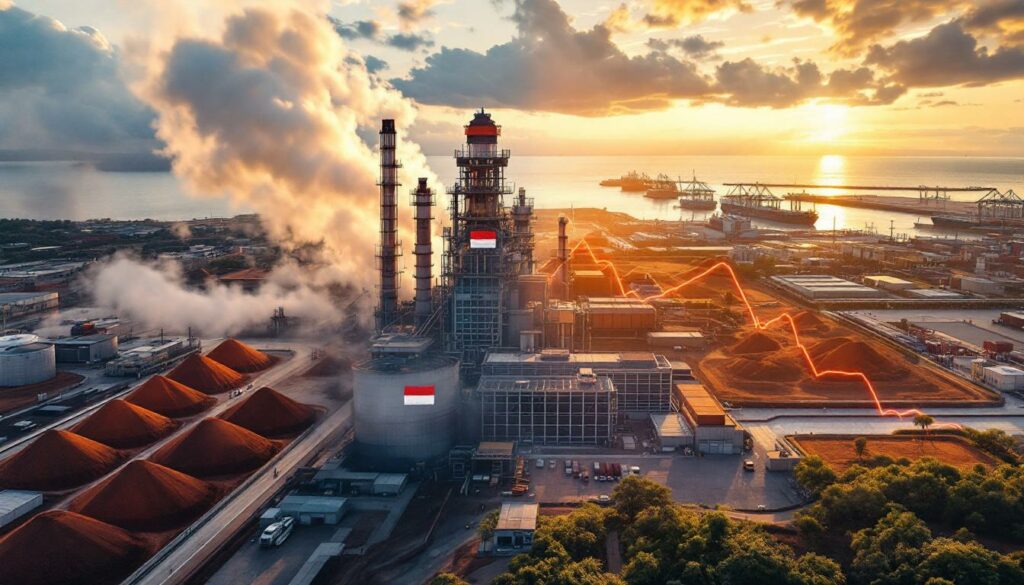Indonesia's Copper Concentrate Export Ban: Seeking Exemptions Amid Economic Impact
Indonesia's strategic decision to ban copper concentrate exports is facing new challenges as economic realities collide with the nation's industrial ambitions. The Nusa Tenggara Barat province has experienced a significant economic contraction directly linked to export restrictions on major mining company Amman Mineral International, prompting high-level ministerial intervention to potentially ease the policy's implementation.
What is Indonesia's Copper Concentrate Export Ban?
The Policy Framework and Implementation Timeline
Indonesia implemented its copper concentrate export ban in mid-2023 as part of a broader resource nationalism strategy aimed at transforming the country's mining sector. The policy represents a significant shift from exporting raw materials to developing domestic processing capabilities, requiring mining companies to invest in local smelting facilities.
While the ban officially took effect in mid-2023, the government granted specific exemptions to companies actively developing domestic processing facilities. Notably, Amman Mineral International received permission to continue exporting until December 2024, aligning with their smelter commissioning timeline.
The policy follows Indonesia's Mining Law No. 4/2009 (as amended), which established the legal framework for restricting raw mineral exports in favor of developing domestic processing and refining industries. This approach mirrors similar policies Indonesia has implemented for other minerals, with copper representing one of the latest extensions of this national strategy.
Strategic Objectives Behind the Ban
Indonesia's copper concentrate export ban serves multiple strategic objectives beyond simple protectionism. The policy aims to:
- Create higher-value products through domestic processing
- Generate additional employment opportunities in manufacturing
- Develop technical expertise in mineral processing
- Increase tax revenue from value-added products
- Reduce dependency on foreign refining capacity
- Establish Indonesia as a regional manufacturing hub
"Indonesia's policy to ban the export of copper concentrates and other raw minerals was implemented to promote domestic metal processing," according to government statements reported by Mining Technology. This industrial policy reflects a deliberate shift from being merely a supplier of raw materials to becoming a producer of refined metals and finished products.
The government envisions that forcing companies to process minerals domestically will create a more robust industrial ecosystem, with downstream industries developing around the smelting and refining operations. This approach has already shown success with nickel, where Indonesia has rapidly expanded its processing capacity and attracted significant investment in electric vehicle battery production.
How is the Ban Affecting Amman Mineral International?
Economic Impact on Operations
Amman Mineral International, one of Indonesia's largest copper producers, faces significant operational challenges due to the export ban. According to Mining Technology's July 2025 report, the company had accumulated approximately 200,000 tonnes of copper concentrate inventory by February 2025, material that would typically be exported.
This stockpile represents substantial locked capital and poses logistical challenges for the company, which continues mining operations while waiting for its smelter to reach full capacity. The company's cash flow has been severely impacted, as it must maintain operational expenses without the corresponding revenue from concentrate exports.
The inability to export has created a financial bottleneck for Amman, which had previously secured a special extension allowing exports until December 2024. However, as technical issues have delayed the smelter's full operational capacity, the company now faces increasing financial pressure without the ability to monetize its concentrate production.
Regional Economic Consequences
The economic impact extends far beyond Amman's balance sheet, affecting the entire Nusa Tenggara Barat province where the company operates. According to official economic data cited by Mining Technology, the province experienced a 1.47% economic contraction in Q1 2025, directly attributed to the export restrictions.
This provincial decline stands in stark contrast to Indonesia's overall economic growth of 5.1% during the same period, highlighting the localized impact of the policy. The region's heavy dependence on mining—which represents approximately 28% of the provincial GDP—makes it particularly vulnerable to disruptions in the sector.
The economic contraction has resulted in:
- Reduced local government revenue from royalties and taxes
- Decreased employment in mining and related service industries
- Negative impacts on local businesses dependent on mining activity
- Reduced consumer spending in the regional economy
This regional economic decline prompted Indonesia's Internal Affairs Minister Tito Karnavian to seek relief for the province by requesting an exemption for Amman Mineral.
Why is an Exemption Being Requested?
Ministerial Intervention
In an unusual high-level intervention, Indonesia's Internal Affairs Minister Tito Karnavian has formally requested that the country's mining ministry consider lifting the export ban specifically for Amman Mineral International. This targeted exemption request acknowledges the severe economic impact on the Nusa Tenggara Barat province while maintaining the broader policy framework.
"I have asked the energy and mineral resources minister whether there is a possibility to allow exports while we are waiting for the smelter to be completed," Karnavian stated, according to Mining Technology's July 2025 report. This ministerial request highlights the tension between Indonesia's long-term industrial policy goals and immediate economic realities.
The request specifically focuses on Amman Mineral rather than a blanket policy change, recognizing the company's progress toward meeting the government's domestic processing requirements. This approach attempts to balance the government's industrial development vision with economic necessity in regions heavily dependent on mining activity.
Technical Challenges with Smelter Operations
Amman's smelter development represents a significant technological and financial investment, but the facility has faced technical hurdles preventing it from reaching full operational capacity. According to Mining Technology, "In March [2025], the company announced the production of its first copper cathode from the new smelter. However, the 220,000tpa facility has not yet reached full capacity due to technical issues."
These technical challenges are not uncommon in new smelter operations, which require complex optimization processes to reach design capacity. Common technical issues in new copper smelters include:
- Heat management and thermal efficiency optimization
- Control of impurities in the production process
- Energy supply reliability and consumption efficiency
- Environmental control systems calibration
- Optimization of recovery rates for metals
Amman spokesperson Kartika Octaviana emphasized that "Government's discernment and policy flexibility, especially regarding copper concentrate sales, will greatly assist the company in maintaining financial strength while seeking to optimise the smelter." This statement highlights the connection between temporary export allowances and the company's ability to invest in resolving technical issues at the smelter.
What Are the Potential Outcomes of This Situation?
Policy Flexibility vs. Resource Nationalism
The Indonesian government faces a challenging decision that will signal its approach to balancing strict resource nationalism with economic pragmatism. Several potential outcomes exist:
- Temporary targeted exemption: Granting Amman a time-limited exemption while maintaining the broader policy
- Conditional export allowance: Permitting exports with specific requirements for smelter improvement timelines
- Revenue-sharing approach: Allowing exports with higher government take during the exemption period
- Maintain strict enforcement: Rejecting the exemption request to preserve policy credibility
Each approach carries both economic and political implications. A temporary exemption would provide immediate economic relief but might be perceived as weakening the government's commitment to its resource nationalism policy. Conversely, maintaining strict enforcement preserves policy credibility but at significant economic cost to the affected region.
The decision will likely establish an important precedent for how Indonesia manages similar situations in the future. As the country continues to implement domestic processing requirements across various minerals, the government's approach to Amman's situation may signal its willingness to accommodate technical and economic realities.
Broader Implications for Indonesia's Mineral Processing Strategy
The outcome of this exemption request could significantly influence Indonesia's overall approach to mineral processing requirements. A temporary exemption that acknowledges technical challenges while maintaining the policy's direction might provide a model for realistic implementation of Indonesia's ambitious domestic processing goals.
The situation highlights the complex challenges in transitioning from raw material exports to domestic processing:
- Technical expertise development takes time
- Capital investment requirements are substantial
- Facility optimization is a complex process
- Regional economic dependencies must be considered
- Global market conditions influence project economics
Indonesia's broader mineral processing strategy has shown success with nickel, where the country has rapidly expanded processing capacity and attracted downstream manufacturing. However, the Amman situation demonstrates that replicating this success across all minerals requires careful consideration of implementation timelines and economic impacts.
How Does This Compare to Other Indonesian Mineral Policies?
Parallels with Nickel Mining Regulations
The copper concentrate export ban situation bears notable similarities to Indonesia's earlier implementation of nickel export restrictions, while also coinciding with new regulatory challenges in the nickel sector. According to Mining Technology, "In a different development, the Association of Indonesia Nickel Miners (APNI) has voiced concerns over the government's plan to shorten the validity of mining quotas from three years to one."
This parallel development in nickel regulations highlights Indonesia's ongoing efforts to tighten control over its mineral resources across multiple commodities. The nickel sector's experience offers potential insights into how the government might approach the copper concentrate situation:
- Indonesia's nickel export ban initially faced resistance but ultimately accelerated domestic processing
- The government granted temporary exemptions during the early implementation phase
- Technical challenges in nickel processing facilities also required implementation flexibility
- The policy eventually succeeded in attracting significant downstream investment
The nickel policy's success in developing domestic processing capacity provides a model that the government hopes to replicate with copper. However, the current concerns from APNI about quota validity periods demonstrate that regulatory refinement continues even in the more mature nickel sector.
Table: Comparison of Indonesia's Mineral Export Restrictions
| Mineral | Ban Implementation | Domestic Processing Requirements | Economic Impact |
|---|---|---|---|
| Copper | Mid-2023 (with extensions) | Smelters producing copper cathodes | 1.47% contraction in Nusa Tenggara Barat province (Q1 2025) |
| Nickel | January 2020 (phased approach) | Processing into nickel pig iron, ferronickel, or nickel matte | Created world's largest nickel processing industry; significant downstream investment |
| Bauxite | June 2023 | Alumina refineries | Initial export revenue losses; processing capacity under development |
The comparison reveals how Indonesia has implemented a consistent resource nationalism strategy across multiple minerals, with varying implementation timelines and economic consequences. The copper situation represents the latest challenge in balancing this national strategy with regional economic realities.
What Factors Will Influence the Decision?
Economic vs. Industrial Development Priorities
The government's decision regarding Amman's exemption request will likely be influenced by several competing priorities:
Economic factors supporting an exemption:
- The 1.47% economic contraction in Nusa Tenggara Barat province
- Employment preservation in the mining sector
- Regional tax revenue maintenance
- Foreign exchange earnings from copper exports
- Maintaining investor confidence in Indonesian mining
Industrial development factors opposing an exemption:
- Maintaining policy credibility and consistency
- Preserving incentives for timely smelter completion
- Supporting the broader resource nationalism strategy
- Avoiding precedents that might undermine other mineral policies
- Ensuring progress toward value-added production goals
The government must weigh these competing priorities within the context of national economic goals, regional development needs, and broader industrial policy objectives. The high-level ministerial intervention suggests that the economic impacts have reached a threshold that warrants policy reconsideration.
Technical Feasibility Considerations
The technical challenges faced by Amman's smelter highlight the practical difficulties in rapidly transitioning from export-oriented mining to domestic processing. The government's decision will likely consider:
- Realistic timelines for smelter optimization based on technical assessment
- Amman's demonstrated commitment to resolving technical issues
- Progress benchmarks that could be tied to any temporary exemption
- Environmental compliance of current smelter operations
- Capacity building needs for technical expertise
These technical considerations must be evaluated against the economic urgency of the situation. A technically informed approach might involve a conditional exemption tied to specific smelter performance improvements and milestones, rather than an open-ended export allowance.
FAQ: Indonesia's Copper Concentrate Export Ban
Why did Indonesia implement the copper concentrate export ban?
Indonesia implemented the ban to promote domestic metal processing, create higher-value products, generate more jobs, and increase tax revenue from its mineral resources. This policy aims to transform Indonesia from a raw material exporter to a producer of refined metals.
The ban follows Indonesia's successful implementation of similar policies for nickel and bauxite, which have attracted significant investment in domestic processing facilities. The government views these policies as essential for capturing more value from the country's natural resources and developing a more sophisticated industrial base.
How has Amman's smelter development progressed?
Amman Mineral International commissioned its 220,000 tonnes per annum copper smelter and produced its first copper cathode in March 2025. This represents a significant milestone in Indonesia's efforts to develop domestic copper processing capacity.
However, the facility has not yet reached full operational capacity due to technical challenges, creating a gap between processing capabilities and concentrate production. This gap has resulted in the accumulation of approximately 200,000 tonnes of copper concentrate inventory that cannot be processed domestically at current capacity levels nor exported under the ban.
What economic impact has the ban had on the region?
The Nusa Tenggara Barat province experienced a 1.47% economic contraction in Q1 2025, directly attributed to Amman's inability to export copper concentrate. This demonstrates the significant regional economic dependence on the mining operation's export activities.
The contraction stands in stark contrast to Indonesia's overall economic growth during the same period, highlighting the localized impact of the policy. This regional economic decline prompted Indonesia's Internal Affairs Minister to request an exemption for Amman Mineral, recognizing the immediate economic hardship facing the province.
How might this situation affect Indonesia's broader resource policies?
The outcome could signal Indonesia's willingness to balance strict resource nationalism with economic realities. If an exemption is granted, it may establish a precedent for flexibility in implementation timelines when significant economic impacts are demonstrated.
This situation may lead to more nuanced policy implementation across Indonesia's mineral sector, where the government maintains its strategic direction toward domestic processing while acknowledging technical and economic realities. The approach taken with Amman could become a model for managing the transition period for other minerals and companies.
Future Outlook for Indonesia's Copper Industry
Balancing Domestic Processing and Economic Stability
Indonesia's approach to the copper concentrate export ban exemption request will likely establish important precedents for how the country balances its resource nationalism policies with economic realities. The government may develop more nuanced implementation timelines that account for technical feasibility and regional economic impacts.
Looking forward, Indonesia will likely maintain its strategic direction toward domestic processing while potentially providing more realistic transition periods. The country's experience with nickel—where initial implementation challenges eventually led to significant processing capacity development—provides a model for how the copper sector might evolve.
The copper industry in Indonesia can expect:
- Continued government pressure to develop domestic processing
- Potential flexibility in implementation timelines based on demonstrated progress
- Increasing technical requirements for smelter efficiency and environmental performance
- Gradual development of downstream industries utilizing refined copper
This balanced approach would allow Indonesia to maintain its resource nationalism strategy while mitigating severe economic disruptions during the transition period.
Investment Implications for Mining Companies
Mining companies operating in Indonesia will closely monitor this situation as it may signal the government's willingness to accommodate reasonable implementation challenges. Future investments in Indonesian mining projects will factor in both the government's commitment to domestic processing and its flexibility in implementation.
Companies considering investments in Indonesia's mining sector should:
- Budget for significant domestic processing investments
- Develop realistic technical implementation timelines
- Consider regional economic dependencies in project planning
- Maintain close dialogue with both national and regional governments
- Prepare contingency plans for potential policy adjustments
The resolution of Amman's situation will provide valuable insights for other mining companies navigating Indonesia's evolving regulatory landscape, potentially establishing a framework for managing the complex transition from export-oriented mining to domestic processing.
Understanding global copper price prediction trends will be crucial for companies developing copper investment strategies in this evolving regulatory environment. Furthermore, the mining industry evolution in Indonesia represents a significant case study in how resource-rich nations balance economic development with resource nationalism.
Indonesia's approach may provide important lessons for other nations implementing similar policies, as demonstrated in a recent export ban case study from Namibia. Additionally, Indonesia's focus on developing domestic mineral processing capacity aligns with global energy transition insights as countries seek to secure critical mineral supply chains.
Disclaimer: This analysis involves forecasts and interpretations of government policy that may change. Mining companies should conduct thorough due diligence and consult with regulatory experts before making investment decisions based on current or anticipated Indonesian mining policies.
Further Exploration:
Readers interested in learning more about Indonesia's mineral export policies can also explore related educational content from Freeport Indonesia's exemption request and Mining Technology's coverage of resource nationalism trends in Southeast Asia.
Want to Capitalise on the Next Major Mineral Discovery?
Stay ahead of the market with Discovery Alert's proprietary Discovery IQ model, which instantly identifies significant ASX mineral discoveries and turns complex data into actionable insights. Explore why historic discoveries can generate substantial returns by visiting our dedicated discoveries page and begin your 30-day free trial today.




